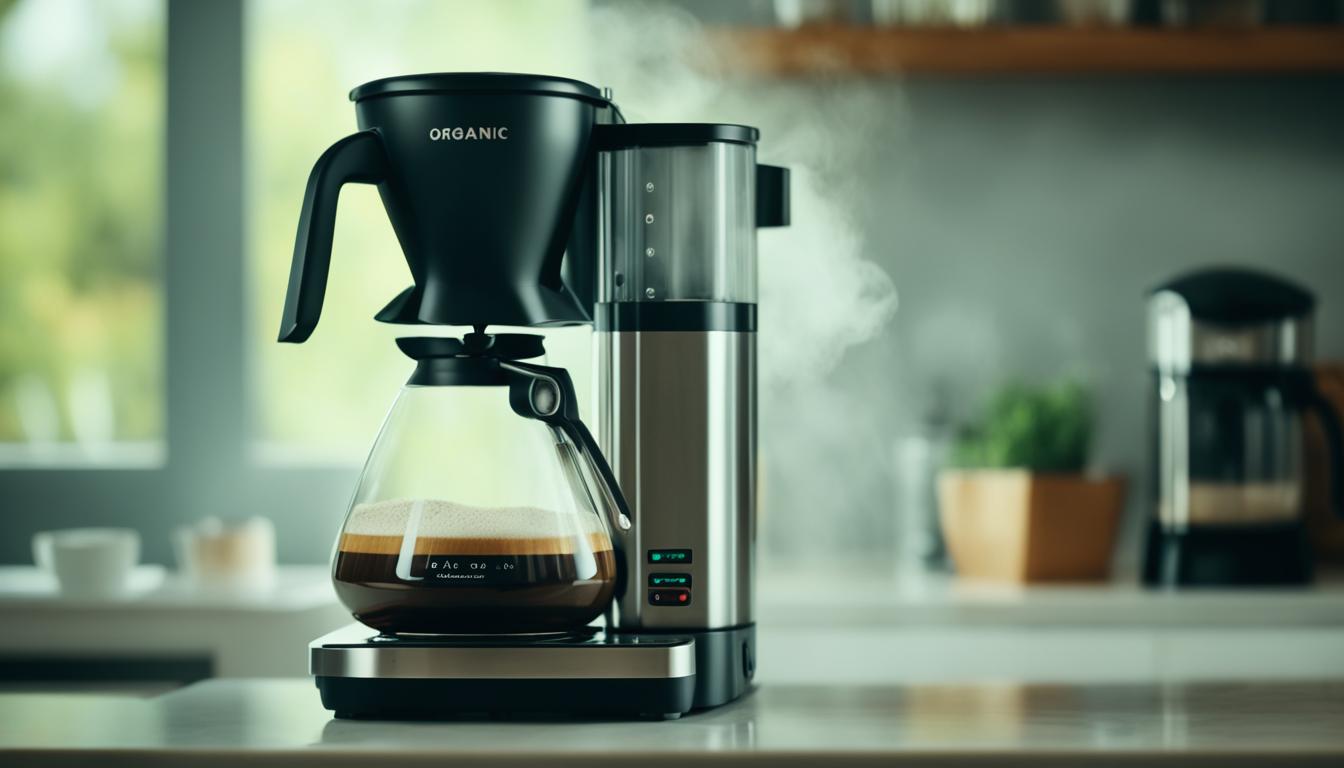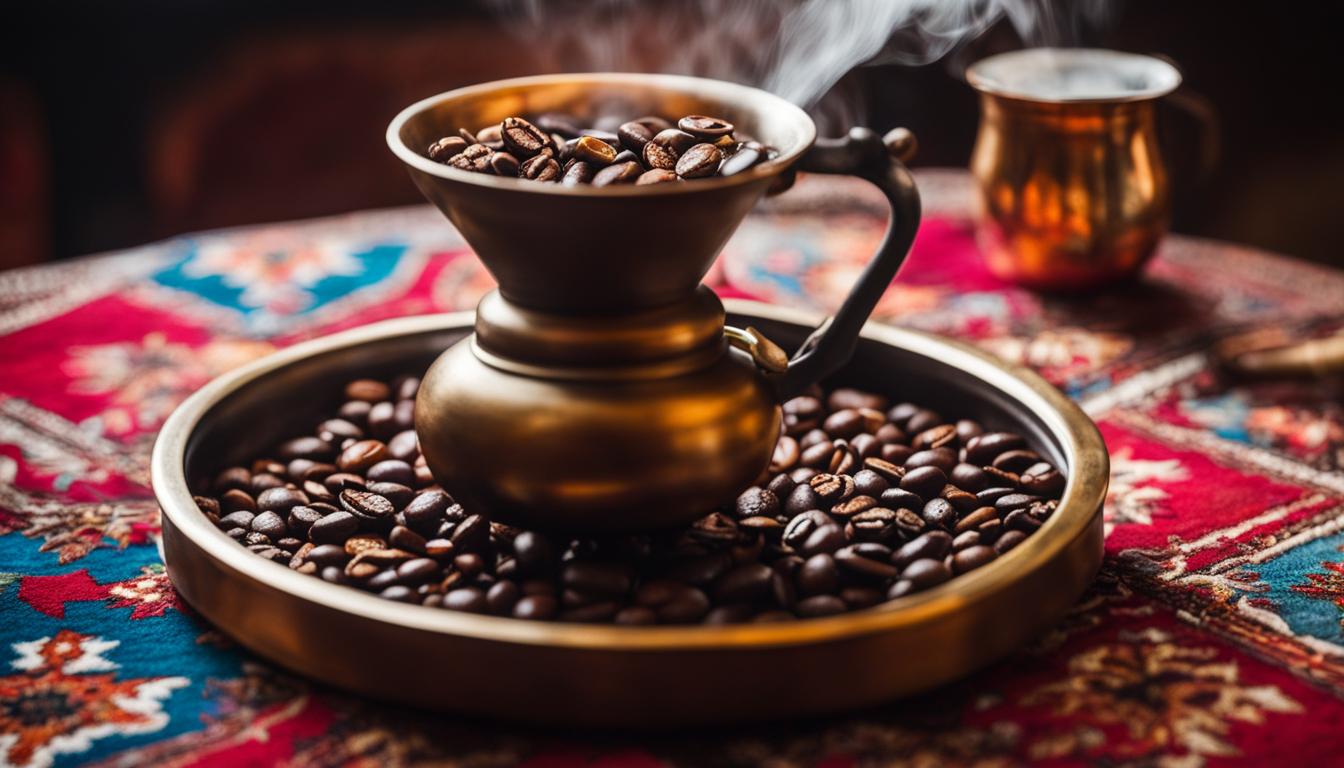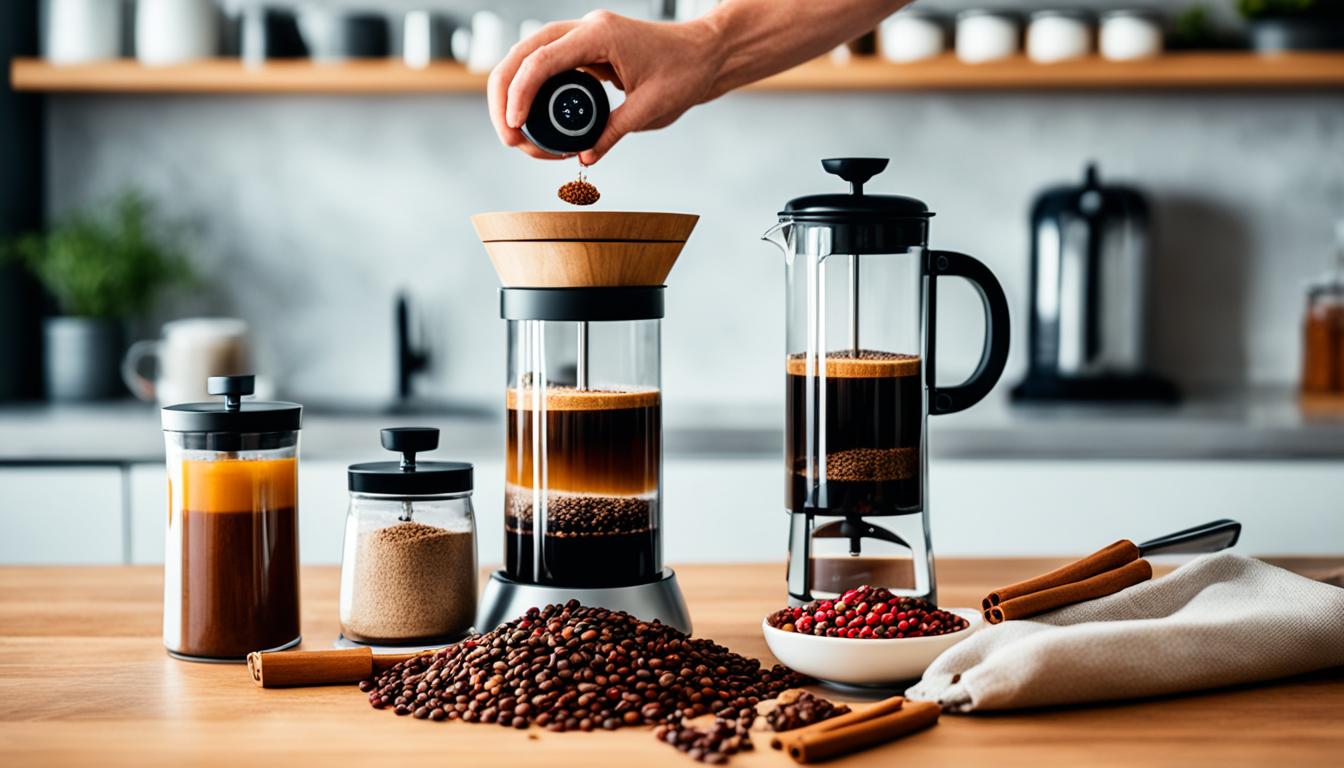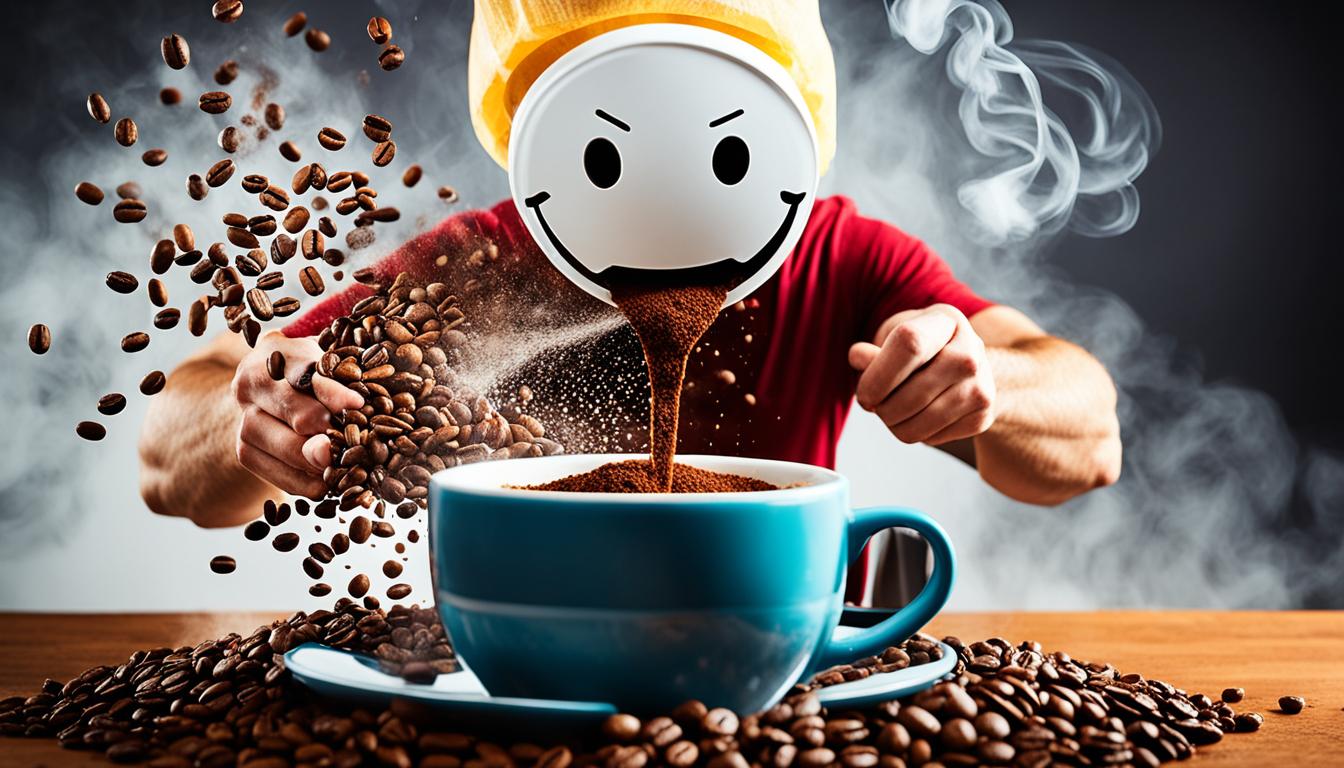Welcome to our guide on mastering the art of coffee steeping! In this article, we will share essential tips and techniques to help you elevate your coffee brewing skills and create the perfect cup every time. Whether you’re a coffee enthusiast looking to enhance your knowledge or a beginner starting your coffee steeping journey, we’ve got you covered.
The art of coffee steeping is a beautiful combination of science and art. By understanding the fundamental principles and applying the right techniques, you can unlock the true potential of your beans and experience the rich and flavorful results.
In this first section, we will dive into the foundational elements of coffee steeping. From grinding your own beans to using filtered water and measuring carefully, each step plays a vital role in delivering a superior coffee experience. By mastering these techniques, you’ll be well on your way to becoming a coffee aficionado.
Key Takeaways:
- Grinding your own beans ensures maximum freshness and flavor extraction.
- Filtered water removes impurities and enhances the taste of your brew.
- Proper storage preserves the freshness and flavor of your coffee beans.
- Accurate measurement of coffee and water ratios is key to a balanced and satisfying cup of coffee.
- Cleaning your coffee machine regularly maintains optimal performance and taste.
Grind Your Own Beans for Freshness and Flavor
When it comes to artisanal coffee steeping, one of the most important steps you can take is grinding your own coffee beans. This simple act can greatly enhance the freshness and flavor of your cup of joe.
Investing in a high-quality burr grinder is essential for achieving a consistent grind size. Unlike blade grinders which can result in uneven grounds, burr grinders ensure a more uniform grind that promotes an even extraction of flavors.
Medium grind for drip coffee
For the best coffee steeping, it’s recommended to use a medium grind size for drip coffee machines. This allows for the perfect balance of extraction, ensuring that the water interacts with the coffee grounds in the optimal way.
By grinding your beans just before brewing, you can ensure maximum freshness and flavor extraction. This is because the aroma and flavors of coffee dissipate rapidly once the beans are exposed to air. When you grind your beans right before brewing, you lock in all the deliciousness.
“Grinding your own coffee beans is like unlocking a world of flavors. It adds that extra touch of care and craftsmanship to your daily coffee routine.” – Coffee Enthusiast
To further enhance your coffee steeping experience, it’s best to avoid using pre-ground coffee. Pre-ground coffee often lacks freshness as it has been sitting on the shelves for an extended period. By grinding your own beans, you have full control over the freshness and the ability to experience the full flavor potential of your coffee.
So, grab a burr grinder, select the perfect grind size, and get ready to embark on an exquisite coffee steeping journey like no other. Trust us, your taste buds will thank you!
Use Filtered Water for Better Taste
When it comes to expert coffee steeping and coffee steeping mastery, one often overlooked factor that can greatly impact the taste of your brew is the quality of water used. We all know that water is an essential component of coffee, but did you know that different water sources can introduce unwanted flavors and impurities into your cup?
That’s where filtered water comes in. By using filtered water, you can remove common impurities like chlorine, fluoride, and other contaminants that can affect the flavor of your coffee. These impurities can mask the true taste of your coffee beans and result in a subpar brewing experience.
But the benefits of using filtered water don’t stop there. The hardness and pH levels of water can also impact the taste of your brew. Hard water, which contains high levels of minerals, can leave behind a chalky residue and affect the extraction of flavors from your coffee. On the other hand, soft water may produce a flat-tasting brew.
So, how can you ensure that you’re using the right water for the perfect cup of coffee? Investing in a countertop water filter is a simple yet effective solution. These filters are designed to remove impurities from tap water, providing you with cleaner and better-tasting water for your coffee steeping endeavors.
By using filtered water, you’re not only improving the taste of your coffee, but you’re also ensuring a clean and balanced extraction. The result? A cup of coffee that truly showcases the flavors and nuances of your carefully selected beans.
Ready to take your coffee steeping to the next level? Let’s explore more tips and techniques to help you master the art of coffee brewing.
Store Your Coffee Properly
Proper storage is crucial for maintaining the freshness and flavor of your coffee. To ensure the best results, follow these expert coffee steeping tips:
- Store your coffee in an airtight container to prevent exposure to air and moisture.
- Avoid placing the container near heat sources to protect your coffee beans from heat and humidity.
- Keep your coffee away from direct sunlight to preserve its flavor and aroma.
- If you have limited space, consider investing in a small drawer or cabinet specifically designed for coffee storage.
By storing your coffee beans in optimal conditions, you can extend their freshness and enjoy the perfect cup of coffee every time.
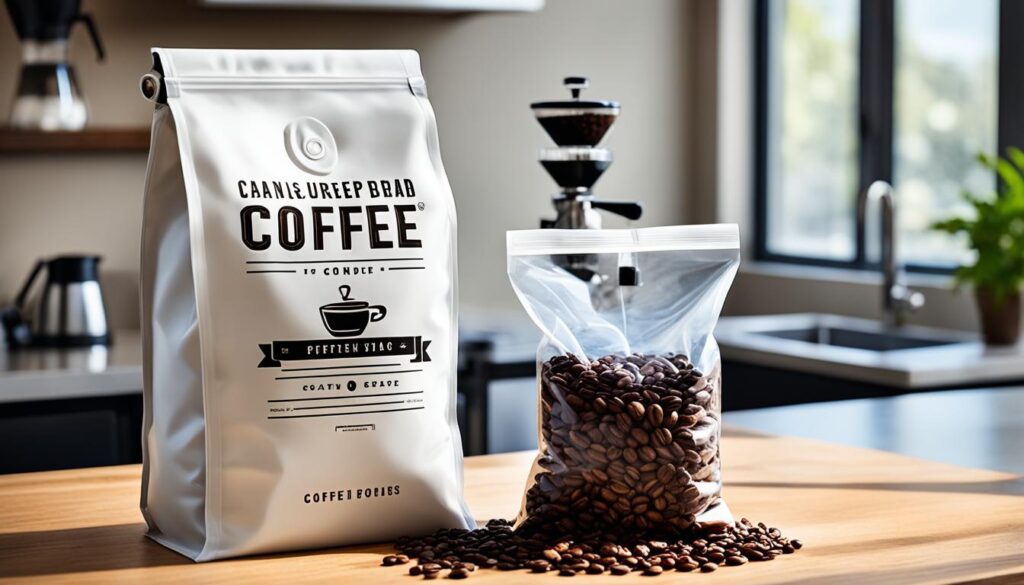
“Proper storage is essential for preserving the delicate flavors and aromas of coffee. By protecting your coffee from air, light, heat, and moisture, you can ensure a consistently excellent brew.” – Coffee Connoisseur
Measure Carefully for the Perfect Brew
To achieve a consistently delicious cup of coffee, precise measurement is essential. Ditch the scoops and cups and opt for a scale instead. By using a scale, you can accurately measure both your coffee and water, ensuring the ideal ratios and a flawless brewing process.
When brewing coffee, the water-to-coffee ratio plays a crucial role in achieving the perfect flavor profile. As a general guideline, aim for a ratio of 16:1 (water to coffee) for a balanced cup. In imperial units, this translates to a ratio of 2:1 (cups to ounces). However, feel free to adjust the ratio according to your personal taste preferences. Just remember that too much or too little water can significantly impact the strength and flavor of your brew.
Proper measurement is the foundation for a well-balanced and satisfying cup of coffee. By meticulously measuring your coffee and water, you can master the art of coffee steeping and consistently achieve that perfect brew.
Key Points:
- Use a scale to measure your coffee and water for precise accuracy
- Aim for a water-to-coffee ratio of 16:1 or 2:1 (cups/oz)
- Adjust the ratio to suit your personal taste preferences
Expert Tip:
Consistent measurement is the secret to unlocking the full potential of your coffee beans. Treat it as an integral part of your coffee steeping mastery and savor the rewards of a perfectly brewed cup every time.
Now that you have mastered the art of measurement, let’s move on to our next section and explore the importance of cleaning your coffee machine for optimal performance.
Clean Your Coffee Machine for Optimal Performance
Regularly cleaning your coffee machine is essential to ensure it performs at its best and delivers the most delicious cups of coffee. A clean machine not only enhances the taste of your brew but also prolongs the lifespan of your coffee maker. Follow these simple steps to keep your machine in top shape:
- Remove coffee grounds from the filter and clean the sides of the filter basket to prevent residual oils from affecting the flavor of subsequent brews.
- Use a paper towel or brush to remove any remaining grounds stuck in hard-to-reach areas.
- Periodically clean your coffee machine with vinegar and water to remove buildup and maintain its efficiency. Consult your machine’s manual for specific instructions on the vinegar-to-water ratio and cleaning procedure.
A clean machine ensures a fresh and flavorful cup of coffee every time you brew. It removes any impurities or residues that could alter the taste of your coffee. By taking the time to clean your coffee machine regularly, you’ll enjoy optimal performance and the best coffee brewing experience.
Benefits of Cleaning Your Coffee Machine
Cleaning your coffee machine offers several benefits:
- Enhances the flavor and aroma of your coffee by ensuring there are no unpleasant residues or flavors.
- Improves the machine’s efficiency and performance, resulting in faster brewing times and consistent temperatures.
- Prolongs the lifespan of your coffee maker by preventing clogs and malfunctions caused by mineral deposits or coffee grounds.
- Ensures a safe brewing environment by removing any potential bacterial growth or mold that may occur in dirty machines.
“A clean coffee machine is the secret to brewing the perfect cup of coffee every time. Don’t overlook the importance of regular cleaning in your coffee brewing routine.”
| Benefits of Cleaning Your Coffee Machine | |
|---|---|
| Enhanced flavor and aroma | + |
| Improved efficiency and performance | + |
| Prolonged lifespan of the coffee maker | + |
| Safe and hygienic brewing environment | + |
Try Different Brewing Methods for Variety
Don’t be afraid to experiment with different brewing methods to discover new flavors and experiences. Pour-over, French press, and cold brew are just a few options to explore. Each method offers unique characteristics and flavors. Trying different brewing methods allows you to appreciate the nuances of different beans and roasts. Expand your coffee horizons and find your favorite brewing method for a truly customized coffee experience.
There are various techniques for steeping coffee, and each one brings out different flavors in the beans. Let’s take a closer look at some popular brewing methods:
Pour-Over
Pour-over brewing is a classic method that allows for precise control over the brewing process. It involves pouring hot water over coffee grounds in a filter cone, allowing the water to slowly drip through, extracting the flavor as it goes. This method produces a clean and nuanced cup of coffee.
French Press
The French press brewing method involves steeping coffee grounds in hot water and then pressing down a plunger to separate the grounds from the brewed coffee. This technique results in a full-bodied coffee with a rich and robust flavor profile.
Cold Brew
Cold brew is a popular method for those who prefer a smoother, less acidic cup of coffee. It involves steeping coffee grounds in cold water for an extended period, usually overnight. The result is a naturally sweet and refreshing brew that can be served over ice.
Remember, each brewing method requires different ratios of coffee to water and specific steeping times. It may take some trial and error to find the perfect combination for your taste preferences, but the journey is part of the fun!
| Brewing Method | Recommended Coffee-to-Water Ratio | Steeping Time |
|---|---|---|
| Pour-Over | 1:15 (1 part coffee to 15 parts water) | 2-4 minutes |
| French Press | 1:16-1:18 (1 part coffee to 16-18 parts water) | 4-5 minutes |
| Cold Brew | 1:4 (1 part coffee to 4 parts water) | 12-24 hours |
Now that you have a taste of the different coffee brewing techniques, feel free to explore further and experiment with other methods like espresso, Aeropress, or Moka pot. The possibilities are endless, and you’ll enjoy uncovering new flavors and aromas along the way. Remember to use high-quality coffee beans, grind them properly, and follow the brewing instructions specific to each method for the best results.
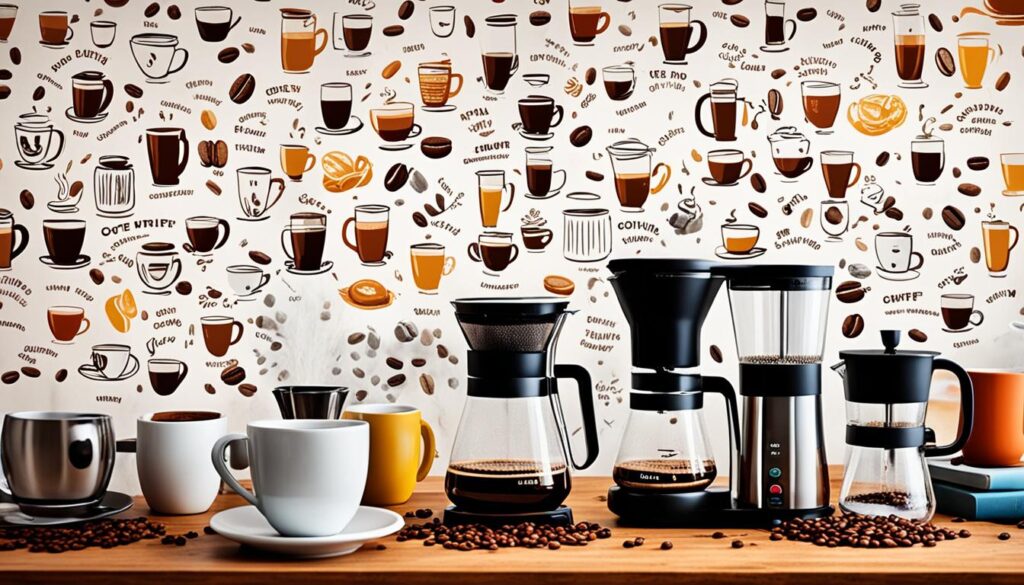
Conclusion
The art of coffee steeping is a journey that allows us to unlock the true potential of our beans. By following the tips and techniques outlined in this guide, we can become experts in coffee steeping, achieving the perfect cup every time. From grinding our own beans for freshness and flavor to using filtered water for better taste, measuring carefully, and exploring different brewing methods, we can elevate our coffee brewing skills to a mastery level.
With each step, we embark on a quest for the perfect cup of coffee, where every sip is a delight for the senses. We take pride in our ability to grind beans to perfection, capturing their unique aroma and taste. The use of filtered water ensures a clean and balanced flavor profile, while precise measurement guarantees the right strength and balance in every brew.
As we experiment with different brewing methods, we open ourselves up to a world of possibilities and discoveries. Each method offers a new perspective, highlighting the nuances of different beans and roasts. It’s an opportunity to craft a truly customized coffee experience that caters to our personal preferences. The joy of coffee steeping lies in the endless possibilities and the satisfaction of creating the perfect cup that brings us joy and contentment.
So, let us embark on this coffee steeping adventure today, armed with knowledge and passion. With each step, we inch closer to coffee steeping mastery and the ultimate achievement of the perfect cup. Let us savor the rich and flavorful results of our labor and relish in the satisfaction of a job well done. Together, we can create our own coffee masterpiece, indulging in a moment of bliss with every sip. Cheers to expert coffee steeping, perfect coffee steeping, and the mastery that comes with it!
FAQ
What equipment do I need to grind my own coffee beans?
To grind your own coffee beans, you will need a burr grinder for a consistent grind size. This ensures maximum flavor extraction. Blade grinders are not recommended as they produce an uneven grind.
Why is grinding your own beans important?
Grinding your own coffee beans just before brewing ensures freshness and maximum flavor. Pre-ground coffee can be stale and less flavorful.
How can filtered water improve the taste of my coffee?
Using filtered water removes impurities like chlorine and fluoride that can affect the flavor of your brew. It also improves water hardness and pH levels, resulting in a cleaner and more balanced extraction.
How should I store my coffee to maintain freshness?
Store your coffee in an airtight container away from air, light, heat, and moisture. Avoid storing near heat sources. Consider using a dedicated drawer or cabinet for coffee storage.
Why is accurate measurement important in coffee brewing?
Accurate measurement ensures a consistent and delicious cup of coffee. Use a scale to measure your coffee and water for the right ratios. Too much or too little water can affect the strength and flavor of your brew.
How often should I clean my coffee machine?
It is important to clean your coffee machine regularly for optimal performance and the best-tasting coffee. Remove coffee grounds, clean the filter basket, and periodically descale your machine with vinegar and water to remove buildup.
What brewing methods should I try?
Experiment with different brewing methods like pour-over, French press, and cold brew to discover new flavors and experiences. Each method offers unique characteristics and flavors.
How can I become an expert at coffee steeping?
By following the tips and techniques outlined in this guide, you can master the art of coffee steeping. From grinding your own beans to using filtered water, measuring carefully, and trying different brewing methods, you can elevate your coffee brewing skills and enjoy the rich and flavorful results.

